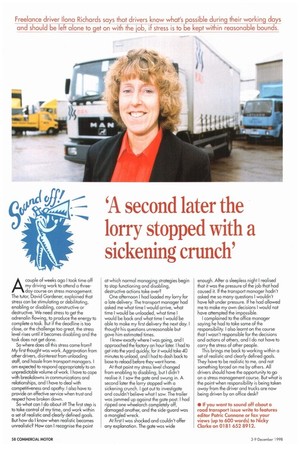Freelance driver Ilona Richards says that drivers know what's possible
Page 60

If you've noticed an error in this article please click here to report it so we can fix it.
during their working days and should be left alone to get on with the job, if stress is to be kept within reasonable bounds.
'A second later the lorry stopped with a sickening crunch'
Acouple of weeks ago I took time off my driving work to attend a threeday course on stress management. The tutor, David Gardener, explained that stress can be stimulating or debilitating, enabling or disabling, constructive or destructive. We need stress to get the aclrenalin flowing, to produce the energy to complete a task. But if the deadline is too close, or the challenge too great, the stress level rises until it becomes disabling and the task does not get done.
So where does all this stress come from? My first thought was work. Aggravation from other drivers, disinterest from unloading staff, and hassle from transport managers. I am expected to respond appropriately to an unpredictable volume of work. I have to cope with breakdowns in communications and relationships, and I have to deal with competitiveness and apathy. I also have to provide an effective service when trust and respect have broken down. So what can I do about it? The first step is to take control of my time, and work within a set of realistic and clearly defined goals. But how do I know when realistic becomes unrealistic? How can I recognise the point at which normal managing strategies begin to stop functioning and disabling, destructive actions take over?
One afternoon I had loaded my lorry for a late delivery. The transport manager had asked me what time I would arrive, what time I would be unloaded, what time I would be back and what time I would be able to make my first delivery the next day. I thought his questions unreasonable but gave him estimated times.
I knew exactly where I was going, and I approached the factory an hour later. I had to get into the yard (quickly, for it would take 40 minutes to unload, and I had to dash back to base to reload before they went home. At that point my stress level changed from enabling to disabling, but I didn't realise it. I saw the gate and swung in. A second later the lorry stopped with a sickening crunch. I got out to investigate and couldn't believe what I saw. The trailer was jammed up against the gate post. I had ripped one wheelarch completely off, damaged another, and the side-guard was a mangled wreck. At first I was shocked and couldn't offer any explanation. The gate was wide enough. After a sleepless night I realised that it was the pressure of the job that had caused it. If the transport manager hadn't asked me so many questions I wouldn't have felt under pressure. If he had allowed me to make my own decisions I would not have attempted the impossible. I complained to the office manager saying he had to take some of the responsibility. I also learnt on the course that I wasn't responsible for the decisions and actions of others, and I do not have to carry the stress of other people. This brings me back to working within a set of realistic and clearly defined goals. They have to be realistic to me, and not something forced on me by others. All drivers should have the opportunity to go on a stress management course. But what is the point when responsibility is being taken away from the driver and trucks are now being driven by an office desk?
• If you want to sound off about a road transport issue write to features editor Patric Cunnane or fax your views (up to 600 words) to Nicky Clarke on 0181 652 8912.






















































































































